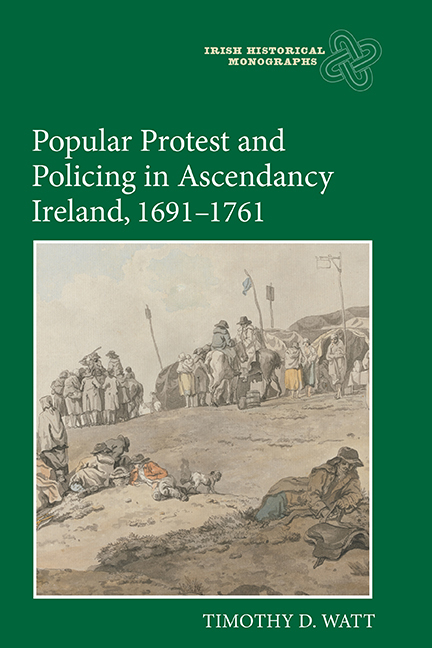Book contents
- Frontmatter
- Dedication
- Contents
- List of illustrations
- Acknowledgements
- Principal abbreviations
- Notes on conventions
- Glossary
- Introduction
- Part One Policing and large-scale disorder
- 1 Civil Law Enforcers in a ‘Self-policing’ Society
- 2 The Standing Army and Policing
- 3 Local Militias, Irregular Forces and the ‘Tory Wars’
- Part Two Popular Protest and Collective Action
- Appendix: Irish Combination Acts, 1705–80
- Bibliography
- Index
- Irish Historical Monographs previous volumes
1 - Civil Law Enforcers in a ‘Self-policing’ Society
from Part One - Policing and large-scale disorder
Published online by Cambridge University Press: 12 October 2019
- Frontmatter
- Dedication
- Contents
- List of illustrations
- Acknowledgements
- Principal abbreviations
- Notes on conventions
- Glossary
- Introduction
- Part One Policing and large-scale disorder
- 1 Civil Law Enforcers in a ‘Self-policing’ Society
- 2 The Standing Army and Policing
- 3 Local Militias, Irregular Forces and the ‘Tory Wars’
- Part Two Popular Protest and Collective Action
- Appendix: Irish Combination Acts, 1705–80
- Bibliography
- Index
- Irish Historical Monographs previous volumes
Summary
1Institutions utilised for policing in Ireland were transplanted from England from the middle ages onwards as part of a process of conquest and colonisation. They were established with the aim of creating a ‘self-policing’ society similar to England, complete with decentralised procedures, private prosecutions, hue and cry and posse comitatus. As far as possible common and statute law were applied and justice was administrated by people in counties, parishes and baronies, modelled on the English shires and ‘hundreds’. By the end of the seventeenth century, Ireland had well-established common law, superseding Gaelic law, administered through royal courts. Other aspects of colonisation also helped authorities to keep the peace. According to Toby Barnard, the creation of towns and the transformation of planter estates into manors were used as devices ‘through which potentially unruly population could be controlled and, when required, disciplined’.
However, a system of self-policing was never fully implemented in Ireland. This was in part a result of the ‘popery laws’ or penal laws, enacted piecemeal by the Irish parliament between 1695 and 1756, which excluded certain groups of people from serving as government officers. The Catholic aristocracy and gentry, who were the main targets of these laws, would normally have expected to serve as senior officers in a ‘self-policing’ society, especially as judges and justices of the peace. Other Catholics, in the middling and lower social orders, served as constables and watchmen, but were removed by the Irish government in national emergencies. During the invasion scare in 1719, for example, warrants were issued to constables commanding them to ‘settle and fix Protestants, and none other, to be watchmen in … their several and respective parishes’. And Presbyterians, who lived mostly in the north of Ireland, were also prevented from serving as justices of the peace. Although the restriction did not have the same impact on Dissenters as it did on Catholics as, according to Archbishop Hugh Boulter, in 1732 only around twenty Presbyterians had enough land or wealth to qualify as a magistrate.
In early eighteenth-century Ireland the term police did not refer to a uniformed force. Rather, it implied a system of government that could ‘regulate broad aspects of communal existence with the aim of establishing the common good of the community’ and was closely associated with maintenance of the moral order and maximisation of national resources.
- Type
- Chapter
- Information
- Publisher: Boydell & BrewerPrint publication year: 2018



